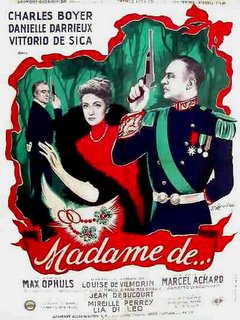A case in point where diamonds are not a girl's best friend.
 In preparation for Patrice Chereau's Gabrielle, I screened a little seminal gem known as The Earrings of Madame de... or, more succinctly, Madame de.... It's a tawdry little tale quite similar to Fontaine's Effie Briest, though more materialistically involved than the innocent Effie. Unfolding like the love child of early Sirk and von Sternberg, the melodrama follows a (un)certain Madame who hocks a pair of earrings given to her on her honeymoon to pay off a "gambling debt." So vast is her jewelbox (hmmm...) that she mistakes the jewels for a pair she acquired for herself. The jeweler, to whom she sells them, resells them to Madame's husband as, to account for the errant bijoux, she claimed them to be stolen at the opera the prior evening. And, as an act d'amour, Monsieur de... gives them to his courtesan as a parting gift. Again, to repay a gambling debt, she must hock them in Constantinople where they are bought by Vittorio De Sica who, in turn, falls madly in love with Madame de... As you can imagine, he bestows the treasure onto his new paramour - the jewels' initial owner.
In preparation for Patrice Chereau's Gabrielle, I screened a little seminal gem known as The Earrings of Madame de... or, more succinctly, Madame de.... It's a tawdry little tale quite similar to Fontaine's Effie Briest, though more materialistically involved than the innocent Effie. Unfolding like the love child of early Sirk and von Sternberg, the melodrama follows a (un)certain Madame who hocks a pair of earrings given to her on her honeymoon to pay off a "gambling debt." So vast is her jewelbox (hmmm...) that she mistakes the jewels for a pair she acquired for herself. The jeweler, to whom she sells them, resells them to Madame's husband as, to account for the errant bijoux, she claimed them to be stolen at the opera the prior evening. And, as an act d'amour, Monsieur de... gives them to his courtesan as a parting gift. Again, to repay a gambling debt, she must hock them in Constantinople where they are bought by Vittorio De Sica who, in turn, falls madly in love with Madame de... As you can imagine, he bestows the treasure onto his new paramour - the jewels' initial owner.
And this, my friends, is the first 45 minutes. What follows is a masochistic game of wills, as the earrings slide from hand to hand, endowing greater meaning by the moment. Monsieur is a malevolent and unfathomably cruel man, but Madame is equally contemptible in her foolish ignorance of social codes. Her overzealous lust for De Sica's Donati does not allow for the (if nothing else) discretion which extra-marital affairs necessitate. When she first meets Donati, rather than recalling physical features or personal interactions, Madame describes each accessory which adorned the gentleman, right down to the horse head cuff links. The melodrama, for the period, is overplayed, much like the brutality of their actions. I was frankly shocked by both her harlotry and his emotional cruelty, in equal measure. In quite theatrical gestures, those betrothed are locked in a frenzy of one-upmanship. And, as you may suspected, the final result is a duel between the conflicting hommes. The entire time, however, you are aware that, whomever is wounded, the victim will be Madame de... It was her frivolousness that resulted in all of this. Not a very feminist stance, but at least Monsieur is also implicated - hardly resisting extra marital temptations. Theirs is a political and kinly union, as they ascertain in one of the films few startlingly frank discussions of their non-romantic union. It is remarkably sober and admirable at these moments. That the visuals are pure sumptuousness is merely icing on the cake.

0 Comments:
Post a Comment
<< Home